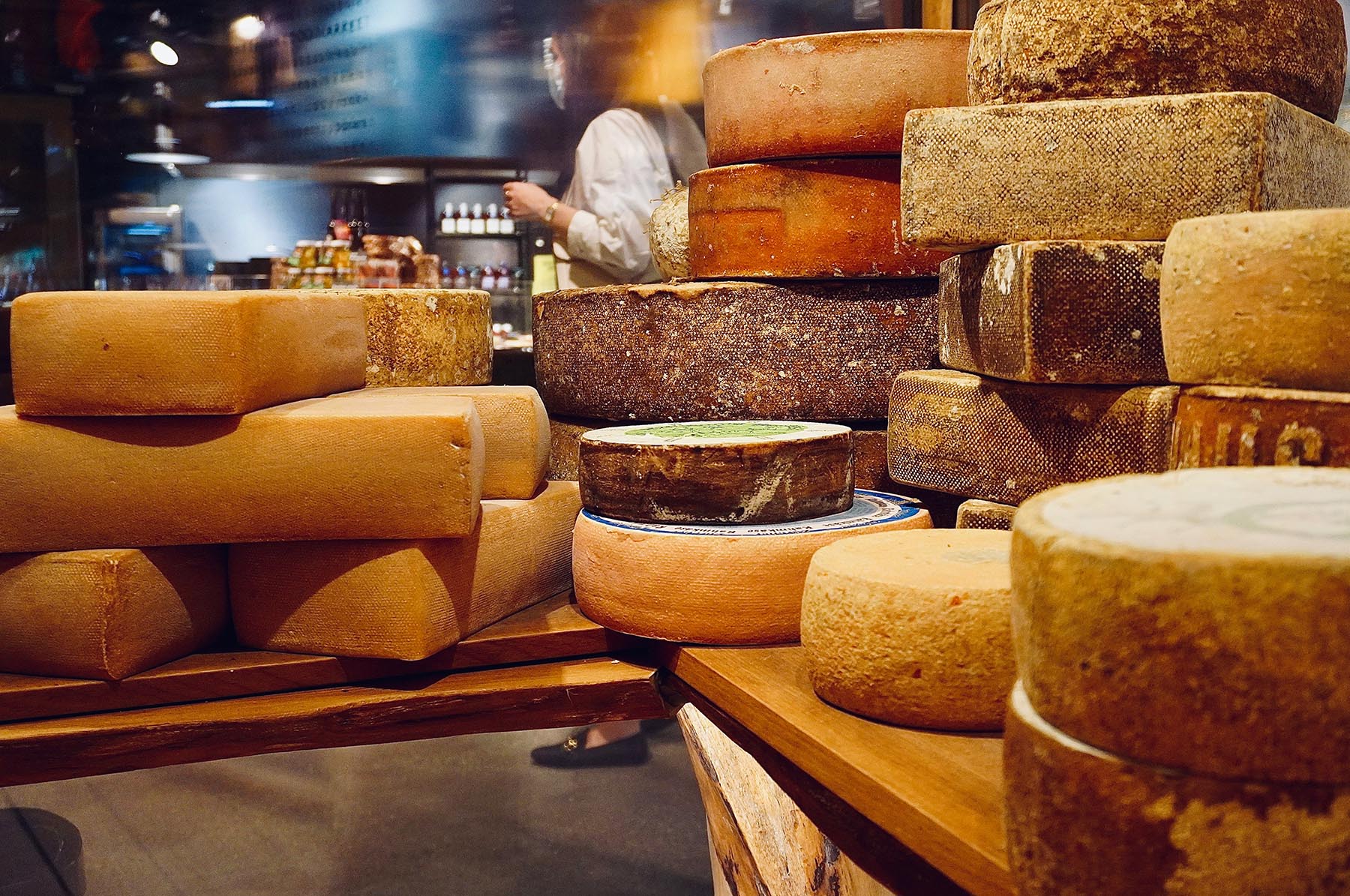
Artisan Wisconsin cheese represents the pinnacle of cheese craftsmanship, embodying the state’s rich dairy heritage and commitment to quality. Produced by skilled cheesemakers who blend tradition with innovation, artisan cheeses from Wisconsin are a testament to the art and science of cheese production. Each wheel or block is carefully crafted in small batches, often using time-honored techniques passed down through generations. These cheeses reflect the terroir (the complete natural environment in which it is produced, including factors such as the soil, topography, and climate) of Wisconsin’s fertile land and pristine water sources, resulting in unique and complex flavor profiles that captivate the palate. Whether it’s a creamy gouda, cave-aged cheddar, or a tangy, handcrafted blue cheese, artisan Wisconsin cheese is an expression of dedication, creativity, and the pursuit of cheese perfection, making it a beloved and sought-after culinary treasure for cheese connoisseurs worldwide.
Wisconsin is well known for its cheese for several reasons:
- Dairy Farming & Abundant Milk Supply: Wisconsin has a long history of dairy farming, dating back to the 19th century. The state’s climate and geography are well-suited for dairy production, with plenty of fertile land for grazing and growing the feed needed for dairy cows. Wisconsin consistently ranks among the top states in the United States for milk production. The state’s dairy farmers have access to a steady and abundant supply of high-quality milk, which is a critical ingredient in cheese production.
- Skilled Cheese Producers: Wisconsin has developed a strong tradition of skilled artisan cheese producers and cheesemakers over the years. These individuals and companies have honed their craft, producing various cheese types, from cheddar and mozzarella to specialty cheeses like Swiss, Gouda, Brick, and Colby.
- Cheese Quality and Standards: Wisconsin has high-quality standards for artisan cheese production, ensuring that cheese made in the state meets specific criteria for flavor, texture, and safety. This commitment to quality has contributed to the state’s reputation for producing some of the finest cheeses in the United States.
- Cheese Competitions: Wisconsin hosts numerous cheese competitions and events, including the prestigious World Championship Cheese Contest and the US. Championship Cheese Contest. These events draw cheese producers from around the world, further highlighting the state’s dedication to cheese excellence.
- Cheese Marketing and Promotion: Wisconsin has actively promoted its cheese industry through marketing campaigns and initiatives. The “Wisconsin Cheese” label has become synonymous with quality and craftsmanship, helping to elevate the state’s reputation as a cheese-producing powerhouse.
- Cheese Tourism: Wisconsin also embraces cheese tourism, with many cheese factories offering tours and tastings. Visitors to the state can experience firsthand the art and science of artisan cheese production, making it a popular destination for cheese enthusiasts.
- Cheese Innovation: Wisconsin’s cheesemakers are known for innovating and creatively developing new cheese varieties and flavors. This spirit of innovation keeps the industry dynamic and continually introduces new products to the market.
How long has cheese production been going on in Wisconsin?
As briefly touched on above, cheese production in Wisconsin began in earnest in the mid-1800s with the arrival of European immigrants, many of whom were skilled in dairy farming and cheese making. The state’s fertile land and favorable climate provided an ideal environment for raising dairy cows and producing milk.
In the late 1800s, cooperative creameries started to emerge in Wisconsin. These community-based creameries allowed local farmers to pool their resources and share cheese-making facilities. This collaborative approach helped standardize cheese production and ensure consistent quality. It also gave rise to the birth of cheddar cheese and Wisconsin quickly became known for this variety. By the late 1800s and early 1900s, Wisconsin cheddar gained recognition for its quality and taste, attracting attention in the United States and internationally.
In the 20th century, the state saw the rise of cheese factories, which were often family-owned and operated. These factories played a pivotal role in expanding Wisconsin’s cheese production capacity, allowing for the creation of various cheese varieties beyond cheddar. These factories helped establish rigorous quality standards for cheese production to ensure consistency and safety. This commitment to quality has helped maintain the state’s reputation as a premier cheese producer. Today, Wisconsin continues to lead the United States in overall cheese production.

What varieties of cheese is Wisconsin known for?
As a leading cheese-producing state in the United States, Wisconsin is known for producing a wide variety of cheeses. Some of the notable cheese varieties and styles that Wisconsin is known for include (but are not limited to):
- Cheddar: Cheddar is one of the state’s most iconic cheese varieties and Wisconsin is renowned for its delicious cheddar cheeses, offering a broad range of cheddars from mild to extra sharp.
- Colby: Colby cheese originated in Wisconsin and is known for its mild, creamy texture and flavor. It is often used in sandwiches and snacking.
- Monterey Jack: Similar to Colby, Monterey Jack cheese has a mild, slightly tangy flavor and is a staple in many dishes.
- Mozzarella: Wisconsin produces a significant amount of mozzarella cheese, which is commonly used for pizza, lasagna, and other Italian-inspired dishes.
- Swiss: Swiss cheese, including the famous Wisconsin Emmental and Baby Swiss varieties, is produced in the state and is known for its nutty flavor and characteristic holes or eyes.
- Provolone: Both mild and aged versions of Provolone cheese are made in Wisconsin and are perfect in sandwiches and many Italian-inspired dishes.
- Blue Cheese: Wisconsin is well known for its blue cheese varieties, with award-winning options like Maytag Blue and Buttermilk Blue.
- Gouda: Wisconsin produces creamy and flavorful Gouda cheese, often aged for different lengths of time to develop various flavor profiles.
- Limburger: Limburger cheese is made in Wisconsin and is known for its strong aroma and pungent flavor.
- Parmesan and Asiago: Wisconsin produces hard, aged cheeses that are similar to Parmesan and Asiago, suitable for grating and adding to a variety of dishes.
- Brick: With its mild buttery flavor, Brick cheese has its roots in Wisconsin and is a popular choice for sandwiches and melting.
- Muenster: Muenster cheese is produced in Wisconsin and is recognized for its creamy texture and mild, slightly tangy taste.
- Havarti: Havarti cheese, both plain and flavored variations, is made in Wisconsin and is known for its buttery, creamy consistency.
- Specialty and Artisanal Cheeses: Wisconsin’ thriving artisan cheese industry produces many unique and innovative cheese varieties, including specialty aged cheeses, flavored cheeses, and small-batch creations.
Wisconsin’s reputation as the “Cheese State” results from a combination of factors, including a strong dairy tradition, a commitment to quality, skilled cheesemakers, and active promotion of the cheese industry. These elements have solidified Wisconsin’s position as a leading producer of cheese in the United States and the world.
Have you ever had cheese from Wisconsin? What variety? What did you think? Let us know in the comments!



